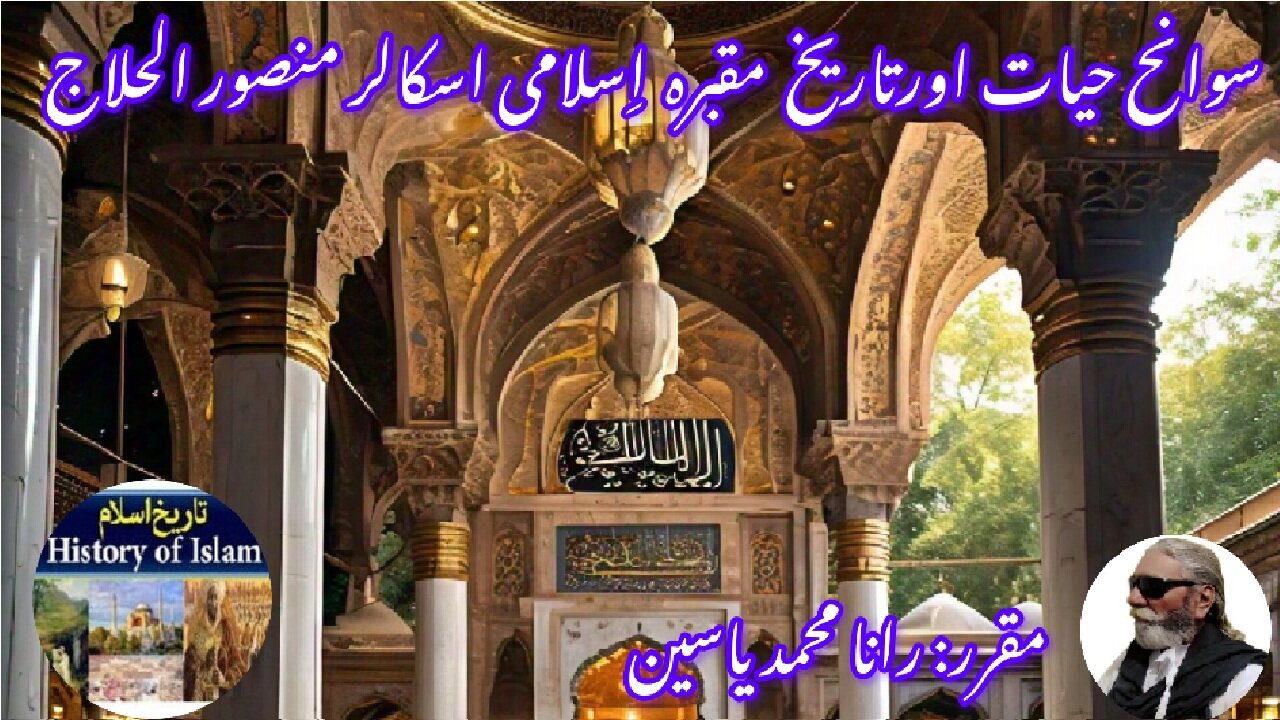Premium Only Content

Islamic Scholar Mansour al-Hallaj | इस्लामिक विद्वान मंसूर अल-हल्लाज | اسلامی اسکالر منصور الحلاج
@islamichistory813 #Mysticism #IslamicPhilosophy #AlHallaj
Biography of Islamic Scholar Mansour al-Hallaj
Dekhti Aankhooon aur sountay kaanoon ko Asslamoalaikum, sisters, brothers friends and elders, In this islamic informative historical video, we present a comprehensive biography of Mansour al-Hallaj, a pivotal figure in Islamic mysticism. Utilizing a range of scholarly texts, including R.A. Nicholson's "The Kashf al-Mahjub" and William C. Chittick's insights on Sufi love, we will examine al-Hallaj's unique spiritual journey and his controversial declarations that led to his execution. This exploration aims to shed light on the significance of al-Hallaj's work, particularly his "Kitab al-Tawasin," and how his teachings continue to inspire seekers of truth today.
Mansur al-Hallaj was born in 858 CE in Tur, a village in the Fars Province of Persia (modern-day Iran). His full name was Abu al-Mughith al-Husayn ibn Mansur al-Hallaj. His father was a wool carder, and thus he earned the nickname "al-Hallaj," meaning "the wool carder." Al-Hallaj's early education took place in Basra and Baghdad, where he studied Islamic jurisprudence, theology, and Sufism under prominent scholars such as Amr ibn Uthman al-Makki and Junayd of Baghdad. He showed exceptional intelligence and spiritual inclination from an early age.
Al-Hallaj's spiritual journey began under the guidance of Sufi masters. He became a prominent figure in the Sufi movement, emphasizing the unity of existence (wahdat al-wujud) and the importance of spiritual love (ishq). His teachings stressed the need for spiritual purification, self-annihilation, and the realization of God's presence within oneself. Al-Hallaj traveled extensively, visiting cities such as Mecca, Medina, and Kufa, spreading his teachings and attracting followers.
Al-Hallaj was deeply influenced by his teachers, particularly Junayd of Baghdad, who emphasized the importance of spiritual discipline and self-purification. Al-Hallaj's teachings also reflected the influence of other prominent Sufis, such as Al-Bistami and Al-Muhasibi.
Al-Hallaj's teachings attracted controversy, particularly his statement "Ana al-Haqq" ("I am the Truth"), which was perceived as claiming divinity. This led to accusations of heresy and blasphemy. After a trial, he was executed by hanging in Baghdad on March 26, 922 CE. His execution was seen as a martyrdom by his followers, solidifying his legacy as a Sufi saint.
Despite his execution, al-Hallaj's legacy endured. His writings, including his famous book "Kitab al-Tawasin" ("The Book of the Inspiration"), continue to inspire Sufis and scholars. His poetry and teachings have influenced prominent Sufis such as Rumi, Attar, and Ibn Arabi.
Al-Hallaj's shrine, located in Baghdad's Al-Rusafa district, became a revered pilgrimage site. The shrine was initially a simple tomb but was expanded during the Abbasid era. The Mongol invasion in 1258 CE destroyed the shrine, but it was rebuilt during the Ottoman era. In 1924, the Iraqi government renovated the shrine, adding a mosque and other facilities.
In 2014, the shrine underwent restoration work, funded by the Iraqi government and UNESCO. The project aimed to preserve the shrine's historical and cultural significance. The shrine complex now includes a mosque, a library, and a museum showcasing al-Hallaj's life and teachings.
Devotees from various Islamic traditions visit the shrine, seeking spiritual guidance and connection with al-Hallaj's teachings. The shrine's inner chamber contains al-Hallaj's tomb, surrounded by intricate calligraphy and ornate decorations.
Al-Hallaj's teachings have profoundly influenced Islamic thought, particularly in the areas of Sufism, theology, and philosophy. His emphasis on spiritual love and unity of existence has inspired generations of scholars and mystics.
Al-Hallaj's teachings have also faced criticism and controversy, particularly from orthodox Islamic scholars who viewed his ideas as heretical. However, his legacy as a Sufi saint and scholar remains unparalleled.
Sisters brothers friends, and elders, now give us permission, up to tomorow, and tomorow we will described Bio Graphy of Islamic Scholar Ali-Shir Navai. Allah Hafiz
====================================
-
 DVR
DVR
SpartakusLIVE
8 hours ago#1 Shadow BANNED Hero
18.9K -
 2:17:46
2:17:46
Kim Iversen
9 hours agoTrump To SMUG Netanyahu: Let's Clear “All” Palestinians From Gaza! | RFK Jr, Tulsi Move On To Round Two
69.9K402 -
 30:25
30:25
Standpoint with Gabe Groisman
1 day agoDemocrats Are Stalling Trump Appointments with Senator Rick Scott
90.8K16 -
 1:00:24
1:00:24
The StoneZONE with Roger Stone
9 hours agoAnthony Fauci’s Brutal History Of Animal Torture Exposed! | The StoneZONE w/ Roger Stone
62.6K18 -
 1:03:38
1:03:38
Man in America
10 hours agoUSAID Corruption, $21 TRILLION Missing, & the End of the US Global Empire?
66.8K41 -
 56:38
56:38
Flyover Conservatives
10 hours ago6 Steps to Take Advantage of Trump’s New Golden Age! - Clay Clark | FOC Show
42.8K2 -
 1:15:25
1:15:25
Glenn Greenwald
10 hours agoTulsi and RFK Jr. Approved by Key Senate Committees; Trump Meets Netanyahu: Wants to Cleanse Gaza; Pro-Palestinian Group Suspended at UMich | SYSTEM UPDATE #402
101K105 -
 1:43:57
1:43:57
Danny Polishchuk
10 hours agoThe Funniest Call In Show On Earth - Live From New York City's Best Comedy Club
59.8K1 -
 1:41:13
1:41:13
megimu32
9 hours agoON THE SUBJECT: Will the Super Bowl Be WOKE??!
44.3K9 -
 1:18:26
1:18:26
Redacted News
10 hours agoBREAKING! USAID Created and Funded COVID-19 Virus and Bioweapons, RFK and Tulsi pass major hurdle
166K234